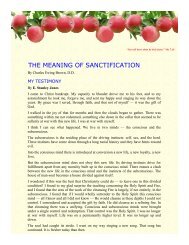W. B. Godbey - Enter His Rest
W. B. Godbey - Enter His Rest
W. B. Godbey - Enter His Rest
Create successful ePaper yourself
Turn your PDF publications into a flip-book with our unique Google optimized e-Paper software.
moderators when they differed in any question of interest to which their attention was called. The umpire was<br />
not a member of either of the churches represented in the debate and was generally a lawyer, judge, or in some<br />
way a very prominent citizen. He called the house to order, called on somebody to pray, and read the proposition<br />
for discussion, stating the attitude of the contestants, as to affirmation and negation. The audiences were<br />
invariably very large and the interest always intense; the debate occupied four hours each day, from ten to<br />
twelve A. M.<br />
and from two to four P. M. Meanwhile the preachers of the contesting churches always preached every night<br />
alternately either with other. As above mentioned, I was driven into these debates by whip and lash and not of<br />
my own choice.<br />
When I was a little child, Alexander Campbell came into that country and preached with great efficiency,<br />
capturing some Baptist churches and dividing others, as he had been a Baptist preacher.<br />
But he had given up their spiritual doctrines and was preaching water regeneration with all his might.<br />
In his “Christian system,” a book which I have read very carefully, he says, “Immersion is regeneration.” He<br />
was a man of great learning and intellect and led the people after him by great multitudes. <strong>His</strong> people were<br />
exceedingly enthusiastic, preaching baptism for the remission of sins, as their great dogma; and at the same time<br />
pouring condemnation on all who did not fall in with them. Campbell's name selected for his people was<br />
“Disciples,” certainly exceedingly appropriate.<br />
They afterwards adopted the simple name “Christians,” which they used in an exclusive sense, unChristianizing<br />
all that did not join them; in fact, usurping the name which is common to the Lord's people in all the earth, and<br />
hence when used alone incompetent to designate any especial organization.<br />
As my father was a Methodist preacher, I had a good opportunity to get acquainted with these current events;<br />
besides, I was a great meeting-goer myself and a close observer with an extraordinary memory. Therefore you<br />
may rest assured that I am not mistaken in what you read in this book. Their attitude was strictly and invariably<br />
controversial and belligerent. They always preached baptism for the remission of sins, utterly denouncing<br />
everything but immersion. This one scripture, “Repent, and be baptized for the remission of your sins,” (Act<br />
2:38), they constantly used, construing “for” in the sense of “in order to,” and making it the prominent condition<br />
of remission of sins. We say a man was hanged for murder and do not mean that he was hanged in order that he<br />
might commit murder, because he had already committed it. The correct translation of this passage, as you see<br />
in the Revised Version, is “unto the remission of sins;” which water baptism symbolizes, and therefore has<br />
reference to.<br />
N. B. Luke wrote the Gospel that bears his name and the Acts of the Apostles, as dictated by Paul.<br />
In the former, (24:47), we have Luke's commission, under which Peter was preaching on the day of Pentecost.<br />
“To preach in <strong>His</strong> name repentance unto the remission of sins to all nations – beginning from Jerusalem.” Here<br />
we see that the commission under which Peter was preaching offers remission of sins to all nations, on condition<br />
of repentance, saying nothing about baptism, which Peter mentions in a hortatory way as a confirmation of their<br />
repentance. The very fact that baptism is not mentioned in Luke 24:47, where we have repentance for the<br />
remission of sins to be preached to all nations, forever settles the question that it is not a condition of remission,<br />
as the Bible does not contradict itself. Salvation is a pure spirituality and not a temporality. It is immaterial, not<br />
material.<br />
Therefore when you make anything which is physical and materialistic a condition of salvation, you run the<br />
subject into idolatry, and sidetrack the efforts of the soul, however earnest, away from Christ, thus defeating the<br />
end in view.<br />
The preaching of the Campbellites from my earliest recollection was constantly belligerent and condemnatory of<br />
all who did not join them and take immersion. They denounced all experimental religion, ridiculing and making<br />
all manner of fun of it; covering it with burlesque, in order to arouse the prejudice of the people against it. I have<br />
attended many a protracted meeting with those people, and certify (for I learned their curriculum till I always<br />
knew what was coming), that they invariably began with a labored effort to prove that there is no such thing as









